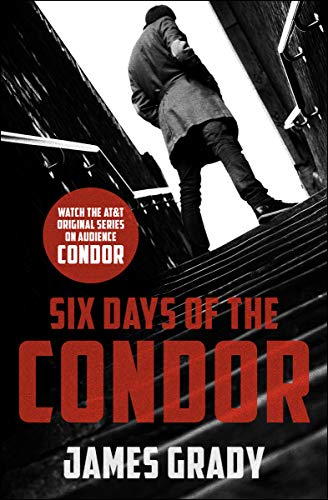Six Days of the Condor by James Grady
Tags: thrillers,
I’m generally not a big fan of spy thrillers, but I wanted to read this one because so many fans of the genre consider it a classic. The plot itself was okay, but the writing and characterization left a lot to be desired.

I think much of the book’s initial success came from it being the right story at the right time. At bottom, it’s a conspiracy novel exposing some of shadier operations of powerful governments, and the lengths to which those governments will go to cover up their crimes.
The author had studied journalism in college, and later worked as a journalist in DC. You can see the effect of his journalistic training in his writing, which favors exposition and telling over immersing the reader in the action. That has its pluses and minuses.
I appreciate concise exposition, and some descriptions of the CIA’s activities and procedures were fascinating. On the other hand, part of the lure of the thriller genre is the feeling of experiencing the action in real time with the protagonist. You don’t get that as much as you’d hope when the author is constantly explaining things to you.
The cat and mouse game is pretty good, with the overmatched protagonist surviving by wits, grit, and luck. The story has some sections that are hard to swallow, including some phone calls where the main character uses unconvincing stories to trick impossibly gullible clerks into divulging sensitive information.
The main character even abducts a woman at gunpoint and through some charm that is entirely invisible to the reader, gains her confidence, sleeps with her, and convinces her to flee with him even though she knows he’s being pursued by trained killers who will slaughter anyone he happens to be with.
I get that the early seventies was a more freewheeling era. This was the first generation to come of age with birth control, AIDS didn’t exist yet, and there was a general sexual openness now that men and women could enjoy themselves without fear of pregnancy, commitment, or social stigma.
Still, this woman was healthy and attractive and she had a job. She could have done better than a shady guy on the run who pulled her out of a diner at gunpoint and made her cook him dinner.
Oh well. As the romance genre is female fantasy, thrillers are male fantasy. If the main character needs some action, he’s going to get it without having to earn it.
For me, the funnest part of reading this was seeing Washington, DC in 1974. For the most part, Grady uses actual places. His agent, Condor, is in and out of Hot Shoppes restaurants in every other chapter. Anyone who lived in DC before 1980 remembers those. Sunny’s Surplus, where Condor goes to buy a change of clothes is another icon everyone from that era would remember.
Young readers picking up this book today with no cultural context probably would not be overwhelmed, but that may be due in part to the fact that Condor provides an archetypal outline of the modern spy thriller that so many subsequent authors have adopted and refined.
It’s still a decent read, if you’re primarily interested in plot-driven stories and aren’t too picky about characters and writing style. One of the author’s primary devices for building tension is presenting scenes in which the reader has a vague sense of who’s in power and what’s at stake, but the reader doesn’t know the true position of the scene’s characters.
We see two men plotting, but we don’t know which side they’re on. We know there’s a traitor, but we don’t know if it’s the guy talking or the guy being talked about. We’re dropped into a meeting, and we’re not sure if the men making the plans want to kill the main character or save him.
The author gets a lot of mileage out of that device, and it works well because he executes it well. It works well in film too, and has been used in almost every thriller from the 1970s on because it’s very effective.